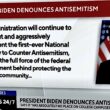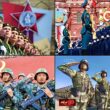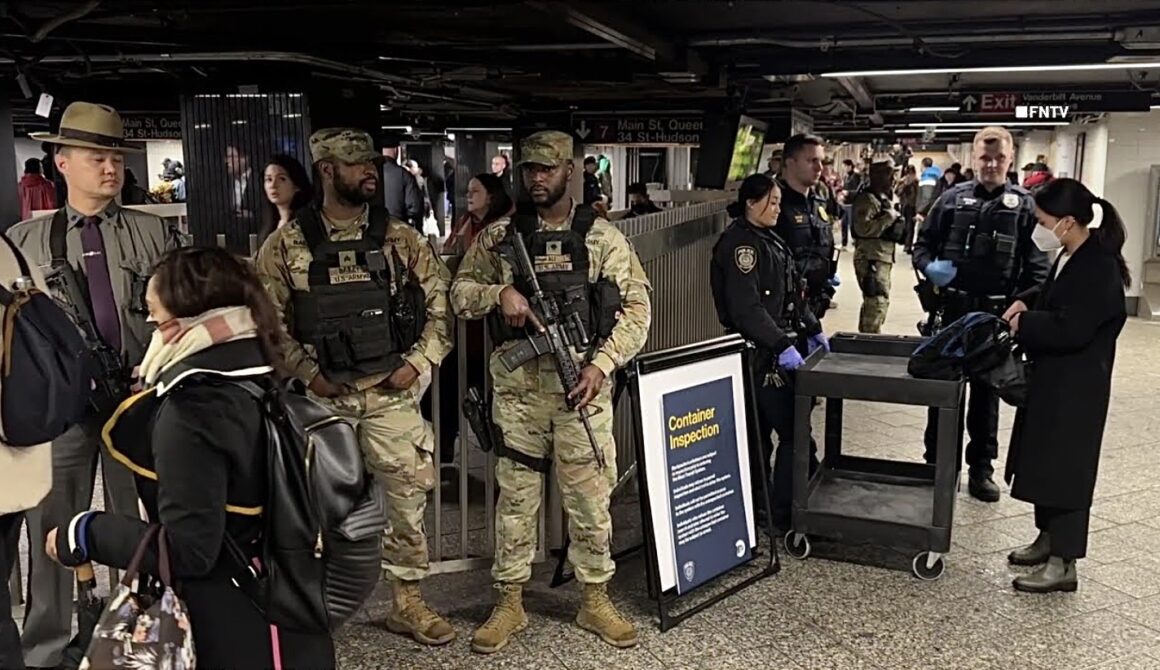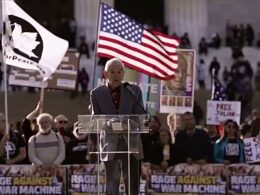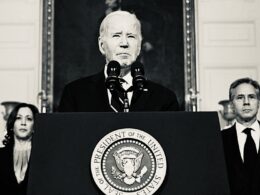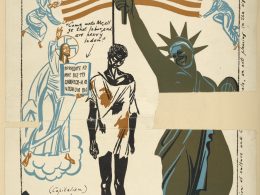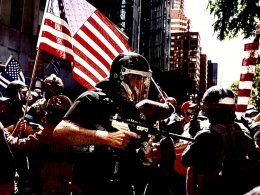The recent development in New York City, where the governor has sent troops to establish checkpoints in the subways, isn’t just a response to ruling class fears over uprisings within the inner cities themselves. It’s also a response to fears of the populations beyond the cities coming to unite with the urban elements, and thereby greatly advancing the mass movement against our imperialist system of government. The way we must respond to this crackdown is by further building such anti-monopoly alliances across our society’s different regions. As well as among the different ideological elements that are compatible with the fight against U.S. hegemony.
We shouldn’t take seriously for a moment the pretext the state of New York has used to justify the checkpoints, that being to ensure against violent crime. Whatever fluctuations in this that have recently happened, the crime rate is relatively low in terms of historical numbers, and a response to it of this kind wasn’t normal in the past. The real reason is that our ruling elites seek to preempt the workers in the class war, during a moment when the system’s crises have created unprecedented potential for the USA’s people to turn against their government.
This effort to normalize troops in public spaces has started in the cities because the urban areas are where the communities which the state seeks to repress are most vulnerable. This is at least true for as long as the urban class struggle remains detached from the rural, and dominated by fundamentally insular “left” orgs. Part of what we need to understand in order to close this regional barrier of separation, and thereby make the state strategically weak, is that the capitalist state’s violence isn’t exclusive to the urban. Nor is it even disproportionately directed at the urban compared to the rural. The communist Phil Neel observes in Hinterland: America’s New Landscape of Class and Conflict that equivalent types of injustice to the ones in the cities get perpetrated against the small towns:
As low growth, deepening crisis, and general austerity continue, more of the new ghettoes will find themselves struggling for shares of a shrinking tax base. These cities will be forced to find new sources of funding, and the easiest way to do this is for better-off residents to utilize existing legal resources in order to prey on the poor. As the economic situation becomes increasingly dire, similar patterns emerge at greater scales: the county, the state, and the federal government will all turn to such predatory practices, facilitated by growing armies of police and preexisting legal mechanisms for debt collection, surveillance, and incarceration…Similar practices have long been applied to the rural poor, including the black residents of regions such as the Mississippi River Delta, Native residents of reservations such as Pine Ridge, Latino farmworkers across the country, and the white poor in places like the coal-mining towns of Appalachia. The difference today is simply that these pilot programs are generalizing at the same time that the demographic inversion pushes the poor into the underfunded near-hinterland of sprawling suburbia.
When we see how much of a shared experience it is among Americans to be attacked or discarded by the forces of monopoly capital, it becomes apparent that concentrating our organizing efforts within the cities is counterproductive. The state is establishing these checkpoints in the places where the urban workers live because the urban workers are in an especially weak strategic location. Not because the urban is where revolutionary politics necessarily have the greatest potential for victory. The ruling class is aware that the workers in both the urban and the rural are capable of winning in their respective regions, with the rural potentially being in a better spot due to how much the state has already tightened its grip over the cities.
By further imposing a police state in the places where it already has a special advantage, the state is trying to compensate for the reality that it faces a growing risk of having its weaknesses elsewhere catch up to it. Of seeing a revolt that spans all the areas where revolutionary potential exists, rendering its inner city repression ultimately impotent.
Our inflation crisis, exacerbated by the imperialist wars our ruling class relentlessly expands, is creating a greater mandate among the USA’s people for resistance towards monopoly capital. It’s pushing those economically crippled communities to seek out avenues for revolt, a situation that the ruling class can’t respond to with state violence alone. It’s needing to limit the use of police or military crackdowns, making the counterinsurgency mainly consist of discourse management and the cultivation of counter-gangs.
The police state and the federal armed forces only feel comfortable with subjugating the American public to a certain extent. The ruling class, or at least its dominant wing, has overall decided to pivot away from direct crackdowns since the 2020 uprising. Trump wanted to impose such a crackdown, then the more pragmatically minded wing of the elites decided it would be best to exercise caution. Maintaining normalcy, or at least an appearance of “normalcy,” is always what the technocratic liberal types of oligarchs prefer.
That’s what makes the New York checkpoints so significant, because the governor responsible for them is the Democrat Kathy Hochul. Hochul has recently been getting a more outwardly reactionary mindset on other things, having said this year to argue for supporting Israel against Hamas: “If Canada someday ever attacked Buffalo, I’m sorry my friends, there would be no Canada the next day, right, right?” Hochul only came to regret this comment because it was counterproductive to the goal of furthering imperialism; it’s still a reflection of the increasingly paranoid way that these elites see the world. Despite their being relatively able to use restraint, the liberal elites want to preemptively attack the country’s people, like how Trump did. The only thing stopping them from putting checkpoints in more urban areas for the time being is the awareness that these kinds of policies at least need to be tested first. Evidently, the subways are the place they’ve chosen to start that testing process.
If the revolutionary orgs fail to sufficiently build networks amongst each other, establish connections to the people, and train internally, then the state will be able to carry out that expansion of its most extreme repressive policies. We have the ability to prevent that worst-case scenario, though, which is why I’ve come to reject pessimistic leftism. The pessimistic left sees developments like the subway crackdown as proof that our situation can only keep getting more bleak. It exclusively focuses on the negative parts of our present reality, and on the most dire potential outcomes. We’ll only see these outcomes if we believe they’re inevitable. It’s absolutely possible to overpower the forces of reactionary violence, which depend on us being demoralized and unconfident in our own ability to impact history.
The mindset behind pessimistic leftism is one which disregards all the evidence that the rural areas, and the other places outside the “left” bubbles, have the capacity to join in on the class struggle. It’s a way of thinking that ironically makes one less able to be a contributor to the struggle, as it impedes the popular unity project we need for the workers to prevail. That’s the lesson we should take from the subway crackdown, Cop City, and the state’s other recent provocations: it’s time to start thinking with a clearer head on strategy in the class war, so we can take advantage of our enemy’s growing weaknesses.
————————————————————————
If you appreciate my work, I hope you become a one-time or regular donor to my Patreon account. Like most of us, I’m feeling the economic pressures amid late-stage capitalism, and I need money to keep fighting for a new system that works for all of us. Go to my Patreon here.
To keep this platform effective amid the censorship against dissenting voices, join my Telegram channel.
